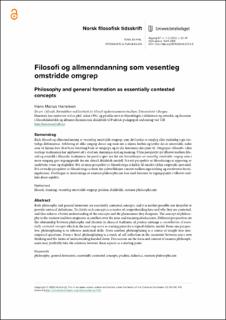Filosofi og allmenndanning som vesentleg omstridde omgrep
Journal article, Peer reviewed
Published version

Åpne
Permanent lenke
https://hdl.handle.net/11250/3044001Utgivelsesdato
2022Metadata
Vis full innførselSamlinger
- Department of Philosophy [247]
- Registrations from Cristin [10237]
Sammendrag
Både filosofi og allmenndanning er vesentleg omstridde omgrep, som det korkje er mogleg eller ynskjeleg å gje eintydige definisjonar. Avklåring av slike omgrep dreier seg meir om å skjøna korleis og kvifor dei er omstridde, noko som vil kunna føra til ei betre forståing både av omgrepa og av dei fenomena dei syner til. Omgrepet «filosofi» i den vestlege tradisjonen har opphavet sitt i strid om danningas mål og meining. Ulike perspektiv på tilhøvet mellom filosofi og retorikk i klassiske tradisjonar for paideia gjev syn for ein konstellasjon av vesentleg omstridde omgrep som i neste omgang gjev utgangspunkt for ein aktuell didaktisk modell. Frå eitt perspektiv er filosoferinga ei oppøving av analytiske evner og dugleikar. Frå eit anna perspektiv er filosoferinga ei kjelde til innsikt i ikkje-empiriske spørsmål. Frå eit tredje perspektiv er filosoferinga ei form for sjølvrefleksjon i møtet mellom eiga tenking og overleverte forståingsformer. Drøftingar av innretninga av examen philosophicum kan med føremon ta utgangspunkt i tilhøvet mellom desse aspekta. Both philosophy and general formation are essentially contested concepts, and it is neither possible nor desirable to provide univocal definitions. To clarify such concepts is a matter of comprehending how and why they are contested, and thus achieve a better understanding of the concepts and the phenomena they designate. The concept of philosophy in the western tradition originates in conflicts over the aims and meaning of education. Different perspectives on the relationship between philosophy and rhetoric in classical traditions of paideia envisage a constellation of essentially contested concepts which in the next step serve as starting point for a topical didactic model. From one perspective, philosophizing is to rehearse analytical skills. From another, philosophizing is a source of insight into non-empirical questions. From a third, philosophizing is a mode of self-reflection in the encounter between one’s own thinking and the forms of understanding handed down. Discussions on the form and content of examen philosophicum may profitably take the relations between these aspects as a starting point.
